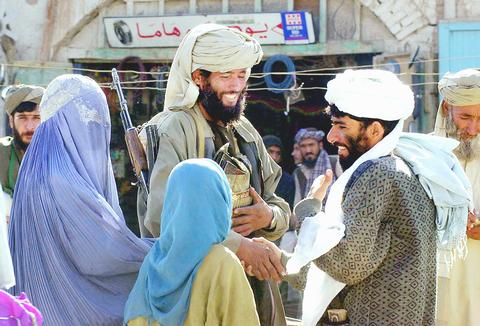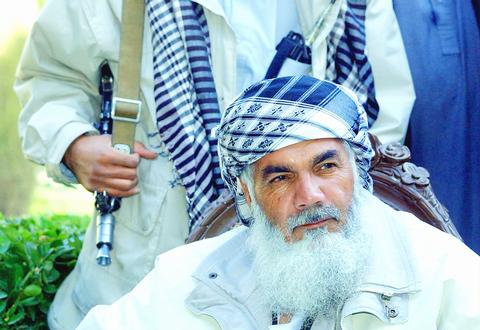It seems as if things are returning to normal in Herat, especially if you are Ismail Khan, a legendary and highly independent warlord here, whose forces chased away the Taliban.
That was Monday, when Khan, commanding Northern Alliance troops, liberated this city in far western Afghanistan. On Tuesday, Khan entered the city in triumph.

PHOTO: AP
By Friday he had been "elected" governor general by thousands of supporters who gathered at a mosque. Thus installed, Khan held a news conference Friday in the lush garden of a villa here and delivered a not-so-subtle message to the West: Thank you for your help, such as it was, but it is no longer needed.

PHOTO: AFP
Khan had governed this province for four years before the Taliban took over and imprisoned him. He escaped last year and went into exile in Iran, which supported him and supplied him for his return here to fight a few months ago. Now, having reclaimed the house that had been given to him by the Afghan royal family, he has begun to govern once again.
Yet governing would seem to be a lesser priority right now. Fighting still comes first. While life in Herat seems to have returned to normal surprisingly quickly, with shops open and streets crowded, some serious issues remain unresolved.
Hundreds of men from nearby villages have poured into Herat and taken up arms. They are everywhere -- in trucks, on tops of vans, in taxis with rifle butts poking out the windows. They carry weapons and ride in cars taken, in many cases, from the Taliban.
Khan, meanwhile, who with his gray-and-white beard and ever-present cadre of young followers resembles the venerable family elder, says he has set a dual course: He is waiting to see whether the Pastuns, the largest group in southern Afghanistan, successfully overthrow the Taliban and is also preparing his own forces to push on toward Kandahar, the Taliban's spiritual center, if necessary.
"If the terrorists do not leave Kandahar, we'll go there to liberate it," he said.
That could complicate plans for the future of a post-Taliban Afghanistan, where, in the absence of an internationally brokered Afghan government, traditional warlords are reclaiming the territory and the power they once held.
Khan, an ethnic Tajik, is part of a minority in Pastun-dominated Afghanistan, where ethnic rivalries and hatreds go back centuries. But he went out of his way to stress that the members of the Northern Alliance agree on the need for a broad-based government, which the American-led coalition and the UN are working urgently to build.
Yet there is no need for foreign peacekeeping forces in the country, he asserted. He described the presence of British paratroopers at Bagram air base near Kabul as a "mistake," saying there was no need for them now that the Taliban had been driven from Kabul. He said Afghanistan did not need the help of the UN to form a representative government. He essentially dismissed Western hopes that the exiled king, Mohammad Zahir, could return to unite diverse ethnic groups.
The king, he said, could play a role in Afghanistan's future "just like any other Afghan." Of the US bombing of Afghanistan, he said, "It was useful in some places," but added, "The support of the local people helped us more."
On Thursday, Khan visited the city of Shandand. As he approached that city, he said: "The people began to rebel against the Taliban starting first at the bazaar. When they reached the bazaar, all the people were cheering and shouting `Allahu Akbar.'"
The only country he praised was Iran, which is just 60 miles from Herat and which has supplied substantial aid to the Northern Alliance and Khan. "Iran is the best model of an Islamic country in the world and we approve of the policy of Iran," he said. But if Khan sees Iran's Shiite Muslims as his allies, the Shiites within his own province are more of a question mark.
One of Khan's aides, Mohammedullah Afsari, conceded that Khan had not yet been endorsed by the province's Shiite population, although an influential Shiite general is one of his allies.
"Different groups have different demands and they want their demands met," Afsari said. But he said that Khan was a charismatic figure, and that "if Ismail Khan says people must get rid of them" -- those who resist him -- "people will." Afsari said that Afghans of all ethnic groups would be appointed to government positions.

ROLLER-COASTER RIDE: More than five earthquakes ranging from magnitude 4.4 to 5.5 on the Richter scale shook eastern Taiwan in rapid succession yesterday afternoon Back-to-back weather fronts are forecast to hit Taiwan this week, resulting in rain across the nation in the coming days, the Central Weather Administration said yesterday, as it also warned residents in mountainous regions to be wary of landslides and rockfalls. As the first front approached, sporadic rainfall began in central and northern parts of Taiwan yesterday, the agency said, adding that rain is forecast to intensify in those regions today, while brief showers would also affect other parts of the nation. A second weather system is forecast to arrive on Thursday, bringing additional rain to the whole nation until Sunday, it

CONDITIONAL: The PRC imposes secret requirements that the funding it provides cannot be spent in states with diplomatic relations with Taiwan, Emma Reilly said China has been bribing UN officials to obtain “special benefits” and to block funding from countries that have diplomatic ties with Taiwan, a former UN employee told the British House of Commons on Tuesday. At a House of Commons Foreign Affairs Committee hearing into “international relations within the multilateral system,” former Office of the UN High Commissioner for Human Rights (OHCHR) employee Emma Reilly said in a written statement that “Beijing paid bribes to the two successive Presidents of the [UN] General Assembly” during the two-year negotiation of the Sustainable Development Goals. Another way China exercises influence within the UN Secretariat is

LANDSLIDES POSSIBLE: The agency advised the public to avoid visiting mountainous regions due to more expected aftershocks and rainfall from a series of weather fronts A series of earthquakes over the past few days were likely aftershocks of the April 3 earthquake in Hualien County, with further aftershocks to be expected for up to a year, the Central Weather Administration (CWA) said yesterday. Based on the nation’s experience after the quake on Sept. 21, 1999, more aftershocks are possible over the next six months to a year, the agency said. A total of 103 earthquakes of magnitude 4 on the local magnitude scale or higher hit Hualien County from 5:08pm on Monday to 10:27am yesterday, with 27 of them exceeding magnitude 5. They included two, of magnitude

Taiwan’s first drag queen to compete on the internationally acclaimed RuPaul’s Drag Race, Nymphia Wind (妮妃雅), was on Friday crowned the “Next Drag Superstar.” Dressed in a sparkling banana dress, Nymphia Wind swept onto the stage for the final, and stole the show. “Taiwan this is for you,” she said right after show host RuPaul announced her as the winner. “To those who feel like they don’t belong, just remember to live fearlessly and to live their truth,” she said on stage. One of the frontrunners for the past 15 episodes, the 28-year-old breezed through to the final after weeks of showcasing her unique